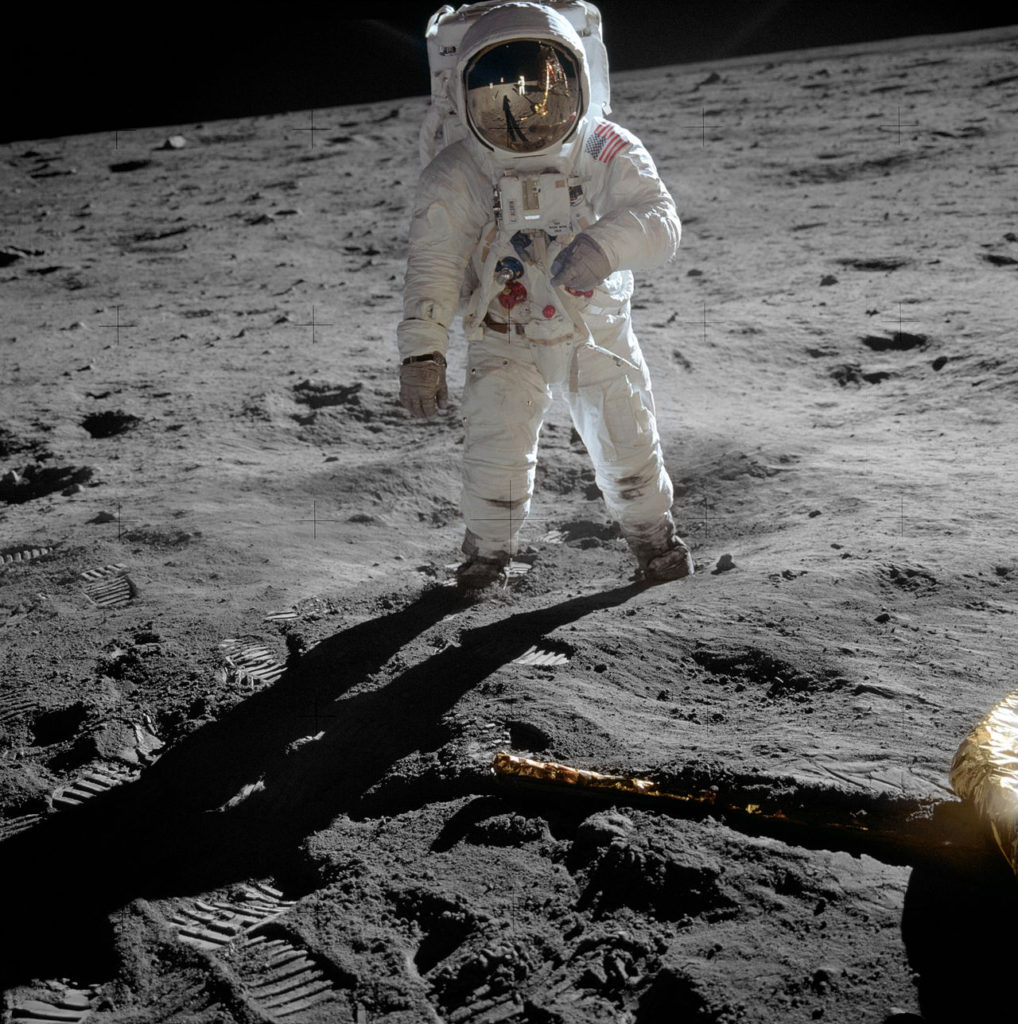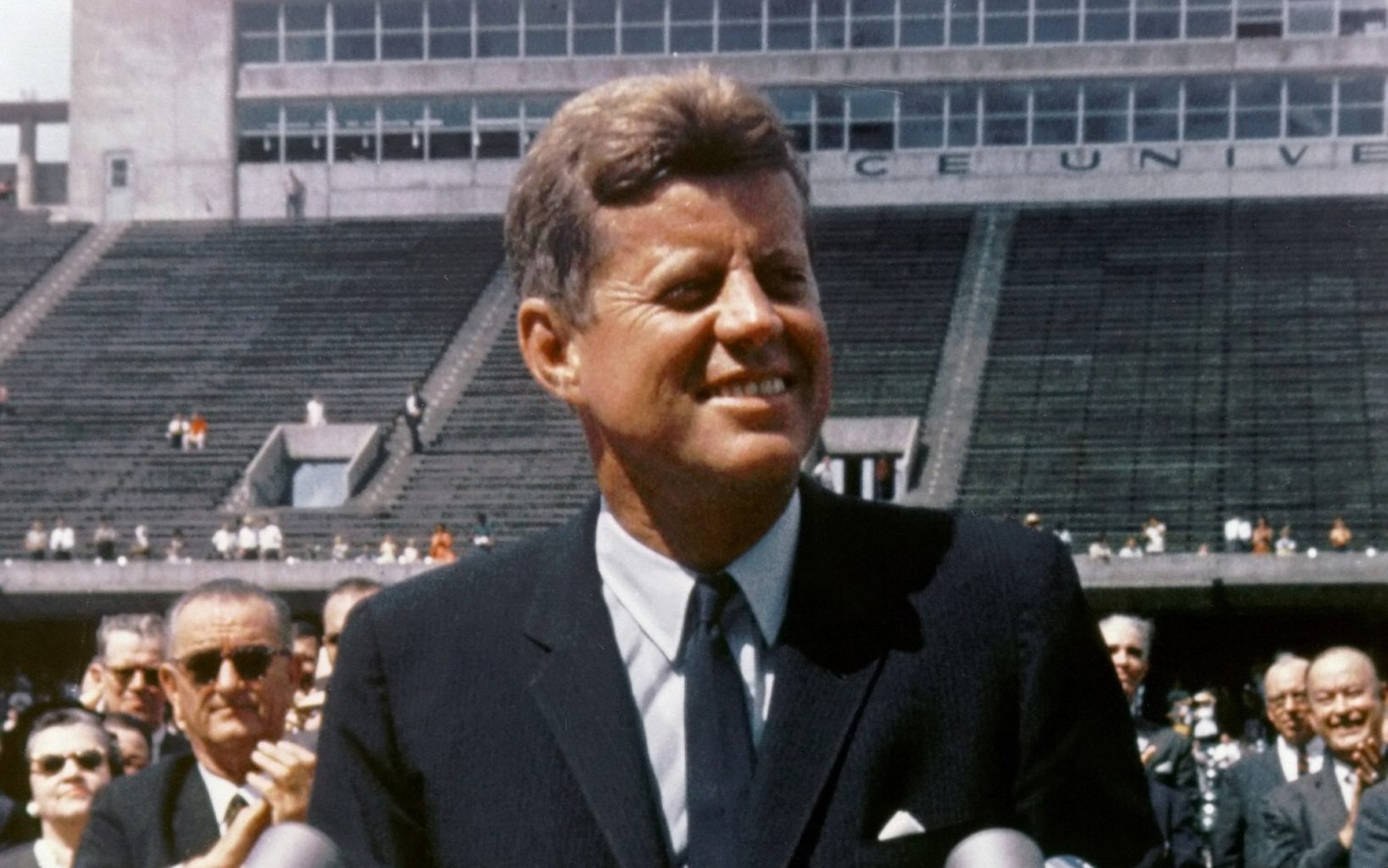
“There are risks and costs to action. But they are far less than the long-range risks of comfortable inaction.”
President John Fitzgerald Kennedy
At the time, this quote by President Kennedy captured our national culture. Back then, we believed, as a nation, we could accomplish anything, even the removal of the two-hundred-year-old-stain of injustice against Black Americans, and putting an end to the Vietnam War that we had no will to win. Also representative of this culture were two extraordinary events, one month apart, that were immortalized in the summer of 1969. One was carefully planned over eight years, starting with President Kennedy’s awe-inspiring speech before the US Congress, while the other was mostly improvised as the event unfolded. The outcomes of both were highly uncertain. However, they shared a common thread; the human spirit to achieve something extraordinary, with one, Apollo 11, bordering on science fiction to touch our moon, and the other, totally unanticipated, involving the greatest music festival of any generation in history, The Woodstock Music and Art Fair.
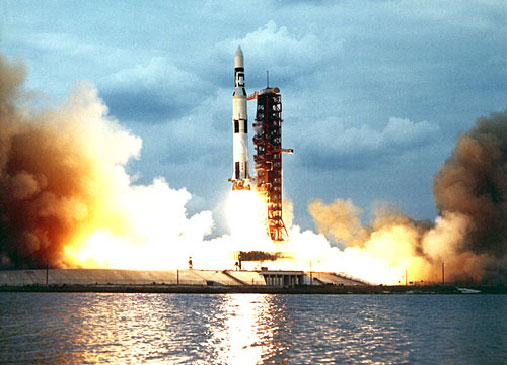

All these events happened because ambitious and creative people were empowered to explore the unknown, accept risk as well as failure, challenge conventional wisdom, and believed in taking bold steps. Individualism and freedom of expression were fundamental to our culture and enabled our nation to become the world economic and military power.
In contrast, today, we find ourselves preoccupied with the political correctness movement, which has as its goal the creation of a socially uniform herd that passes judgment on what it considers to be acceptable behavior for people of an entire nation. Within this movement, individualism and individual expression are not to be tolerated unless they conform to the standards proscribed by the herd. This movement should be of serious concern to all of us because, in the long run, it will be counterproductive to discovering what is true about ourselves and our world. It represents a risk-averse culture at its extreme.
Challenging authority or groupthink was fundamental to the founding of our nation. We are very fortunate to have a First Amendment, which protects an individual’s right to openly disagree with anyone or group no matter how large or powerful. It also protects the freedom of assembly and association. These individual rights are sacred and represent the basic building blocks of a free society. They empower people to explore what we do not know and challenge what we accept as conventional wisdom.
Without these rights, the processes of discovery in fields of science, engineering, mathematics, and invention would be severely compromised, and along with them, opportunities to create our future. It is through open disagreement and scrutiny, no matter how unpopular, that knowledge becomes reliable and of value to humankind. Our unique American environment has enabled human imagination and creativity to flourish through the freedoms provided by these individual rights, which enabled significant scientific, technological, and economic growth that our nation experienced in the 20th century and now, hopefully, will continue to partake in the 21st century.
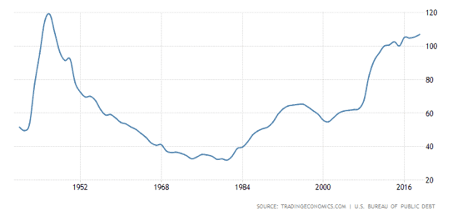
It is not difficult to appreciate the vital role that unique things have played in the growth of our economy. It is human nature to seek out uniqueness along with the joy obtained from discovering it. We derive happiness from seeing, listening, tasting, touching, and owning unique things. As a nation creates more and more unique products and services for consumption, new industries and jobs are created as world demand for them grows. When these unique things are produced in quantity within a nation, tax revenues increase, which, if large enough, enable that nation to afford a government for its people. This strategy, in large part, is how our country reduced its national debt as a percentage of GDP. It went from 120 percent just after WWII to about 30 percent by 1980.
Before and just after WWII, our national culture was a very different one from what it is today. It was a culture that defeated Nazi oppression and saved American lives by putting an end to a terrible war with Japan through the extraordinary development of the first atomic bomb in just three years. It was a culture that was led in succession by four visionary Presidents: Roosevelt, Truman, Eisenhower, and Kennedy. They understood that government investments were needed to rebuild our nation after the war and to prepare our nation for the rise of competition in the world, in particular, the threat of communism. This culture believed it could accomplish anything, including sending humans to the moon and returning them safely back to earth. Our nation accomplished this in just eight years, a feat never matched by any other country.
Nearly every technology we hold dear today is traceable to scientific discoveries and science-inspired inventions sponsored by governments and wealthy patrons, not just our own, over the last four centuries. Many of these unique inventions occurred during the first half of the 20th century and also during the 1950s, 1960s, and 1970s. This latter period was the golden age of science and technology, which produced an explosion of scientific discoveries and unique inventions that the world admired, copied, and continues to improve upon even to this day. The world benefited tremendously from the creation of the digital, communication, and biotechnology revolutions. This period also gave the world programmable high-speed computers, mobile wireless communications, the first demonstration of a robot-driven by artificial intelligence, the laser, the atomic clock that makes GPS possible, MRI, the chemical structure of DNA, the birth of genetic engineering, the internet, supercomputers, nuclear reactors, and many more discoveries and the many unique inventions inspired by them. These developments were the foundation for our economic future, which not only paid off for our nation but also the entire world. Just imagine what our economic growth would be today without investments in discovering what we did not know.
Back then, our federal government did what the private sector could not do or would not do. In contrast, today, our government looks to the private sector for leadership in creating our nation’s future. Government bureaucracies and politicians on Capitol Hill use private sector interests as a benchmark for the spending of hard-earned taxpayer dollars. Our government even spends taxpayer dollars on what the private sector would do anyway, rather than fund the discovery of new knowledge at the frontiers of science, engineering, and mathematics that industry cannot do or will not do. Contrary to what some would like you to believe, the private sector is primarily about risk avoidance. As Leonardo da Vinci said: “He who possesses most must be most afraid of loss.” The private sector fears losing what it values most: money!
Today, the private sector puts a very high premium on the efficient use of money to capture a rate of return on investment. To the private sector, the only truly good ideas are those that make money. Based upon this metric, you would come to the absurd conclusion that all progress in acquiring new knowledge about the natural world from the Italian Renaissance to today was a total waste of time and money.
You can see this aspect of our culture play out on the award-winning ABC television series Shark Tank. Here you have a group of business moguls with business models in their heads that listen to a five-minute business proposal. In the next five minutes, these moguls ask standard questions. Is the product unique and patented? Who are your competitors? What is your customer base, and how large is it, or could it be? How much in sales and profit have you already made and over what period? Why do you need the money, and how would you spend it? These are all questions designed to assess risk and the time over which an investor can expect a return on investment. Depending upon the risk assessment, certain constraints can be put on the money to be invested in ensuring that the investor can at least recover his or her original investment. This approach is not risk-taking, but a rather elaborate exercise in risk avoidance.
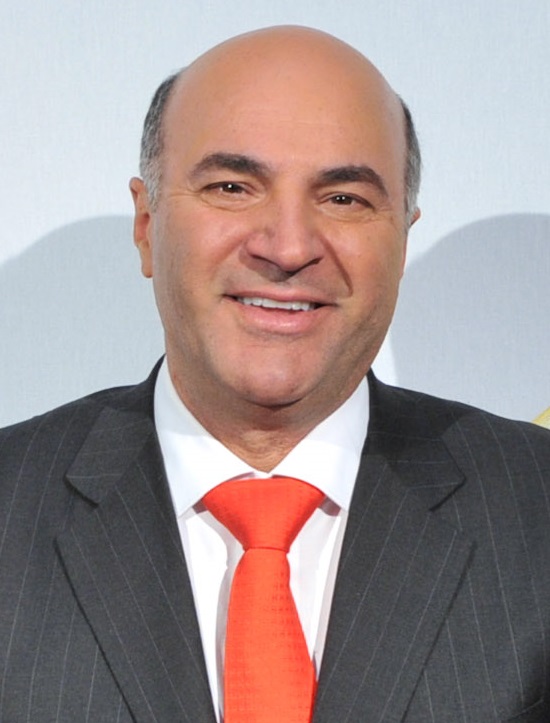
The leader of this group, “Mr. Wonderful”, played by the self-assertive Kevin O’Leary, prides himself on his astute business acumen. When entrepreneurs come to him with a concept that requires any amount of scientific and engineering research, he asks them when they arrived on this planet. He labels them “nutbar 2.0.” Based upon Mr. Wonderful’s minimal risk strategy, rather than enjoying the prosperity we have today, from investments made in the discovery of new knowledge by governments and wealthy patrons over many centuries, our standard of living would be more like that of the 18th century. The results of major technology revolutions, which we enjoy today, would not exist.
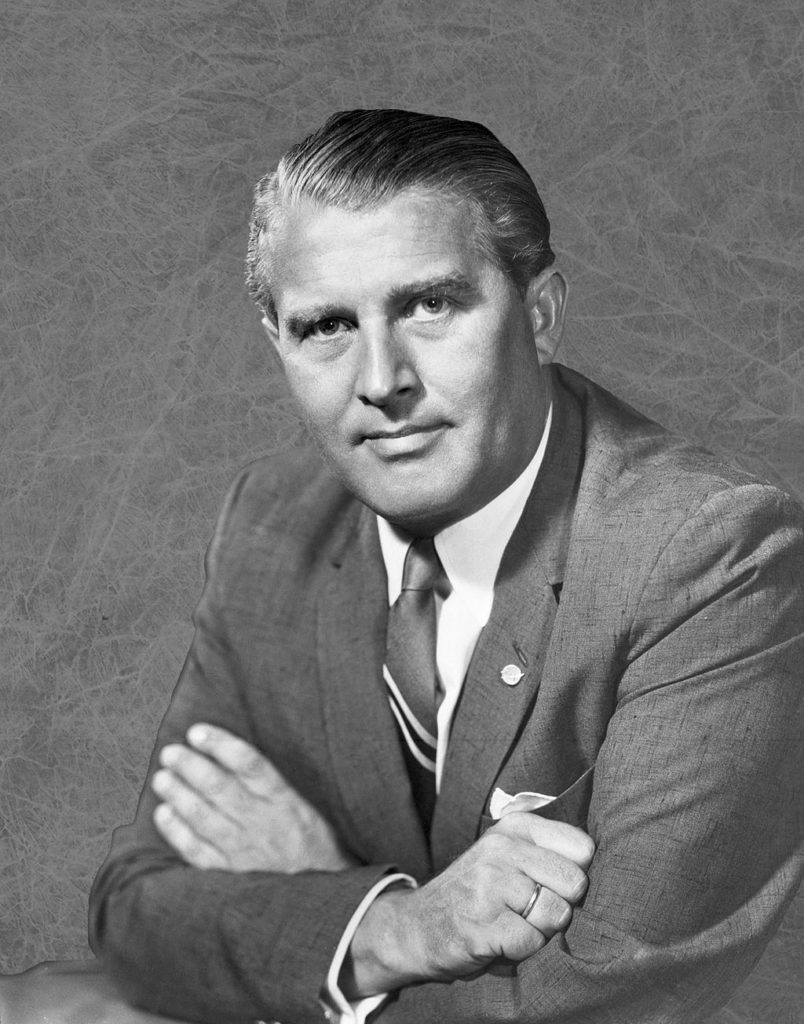
What lies beneath this form of reality entertainment is a persistent tension between two relatively distinct cultures that have shaped the modern world. One has primarily focused on the pursuit of new knowledge about the natural world, which is an upstream activity in the sense that it has the potential to contribute over time to downstream economic growth. It is an inherently inefficient activity because understanding how nature works involves considerable guesswork. As the famous 20th century German aerospace engineer Wernher von Braun once put it: “Research is what I am doing when I don’t know what I am doing.” The other culture is one much more focused on the short-term, through the more predictable and efficient downstream exploitation of knowledge for monetary gain or realizing military capabilities to win a war.
However, there have been more risk-oriented private sector investment strategies in our history. Companies of the 1950s, 1960s, and 1970s, especially some high-tech companies of that era, foresaw the need to expand the frontiers of science and engineering as a fundamental part of their business strategy to compete in the world. Companies of this era took advantage of the foundations of science and engineering primarily developed by the governments of the United Kingdom and the rest of Europe during the 19th and the first half of the 20th century. These powerful knowledge-based assets through education provided these companies with a workforce that was inspired by the frontiers of science and engineering.
Back then, knowledgeable individuals founded companies like Bell Telephone Laboratories, Texas Instruments, Xerox, Hewlett Packard, and Intel, and their leadership had a significant influence on the evolution of technology and specific areas of science and engineering research. These companies competed in high-quality research with the best institutions in the world. They encouraged risk-taking and exploration, which shaped their future and that of the world.
Consider, for example, Bell Telephone Laboratories, which was a science, engineering, and technology powerhouse. At one time, Bell was a company that considered science essential to maintaining its competitive edge in the world. At its peak, Bell Laboratories was the premier organization of its type, developing a wide range of revolutionary technologies, including radio astronomy, the transistor, the laser, information theory that formed the basis of modern communications, the computer operating system Unix and computer programming languages C and C++. In total, eight Nobel Prizes have been awarded for work conducted by extraordinary people at Bell Laboratories. One of these Nobel Prizes involved the most fundamental aspects of matter at an atomic scale, which demonstrated that electrons behave as waves similar to light waves. Another involved the detection of “the echo” from the Big Bang, the event that created our universe 14 billion years ago. This discovery has had profound effects on the way we explore and now understand our universe.
Many of these organizations are either nonexistent in their original form, like Bell, or have undergone considerable cultural change through the focus on quarterly returns measured in earnings per share. As a result, many research jobs within the private sector have been permanently lost over time. Because of this decline in job opportunities, our precious youth turn away from careers in science and engineering. This trend produces negative feedback into our science, technology, engineering, and mathematics educational system, which ultimately limits the creation of opportunities for future economic growth
For those who grew up in the 1950s, 1960s, and 1970s, there has been a stark cultural transformation of our nation. We have gone from a country that took bold steps, led by visionary leaders, to a nation mostly concerned with the fear of failure. Rather than taking risks to figure out what we don’t know, we would rather revisit, repackage and incrementally improve on what we already know. We even talk about going to the moon again as a way of reviving our national spirit of risk-taking. This path to the future is not the way the modern world was created, nor the way the US became the world economic and military power after WWII.
As in the past, bold steps and risk-taking will lead to the development of unique products, which through increased aggregate demand, can pay back that investment many times over. Strategic government investments, like those after WWII, have been a key recurring pattern that enabled the creation of the modern world and also enabled the US to rise as the world military and economic power after WWII. Failure to address the risks associated with the current path we are on now will only make overcoming the mounting headwinds that much more difficult later.
We must not allow the short-term risk-averse priorities in the federal budget to prevent us from investing in our people, equipment, and facilities to create new opportunities through discovery for our future prosperity. We must begin to fix this very serious problem. In the final analysis, the key to addressing this issue is the need for strong dynamic leadership with a vision that can revive the risk-taking spirit of a nation that led the entire world into extraordinary economic growth and prosperity.
As long as we continue to wonder and invest in the human mind to unlock the truth behind the mysteries that surround us without preconceived notions as to what that truth is, there is great potential to improve the human condition. What we need is renewed faith in ourselves and our nation to achieve truly extraordinary things, and to create again a fearless culture of exploration into the unknown that future generations will admire and be inspired by, to continue this great adventure and experiment we call America.
